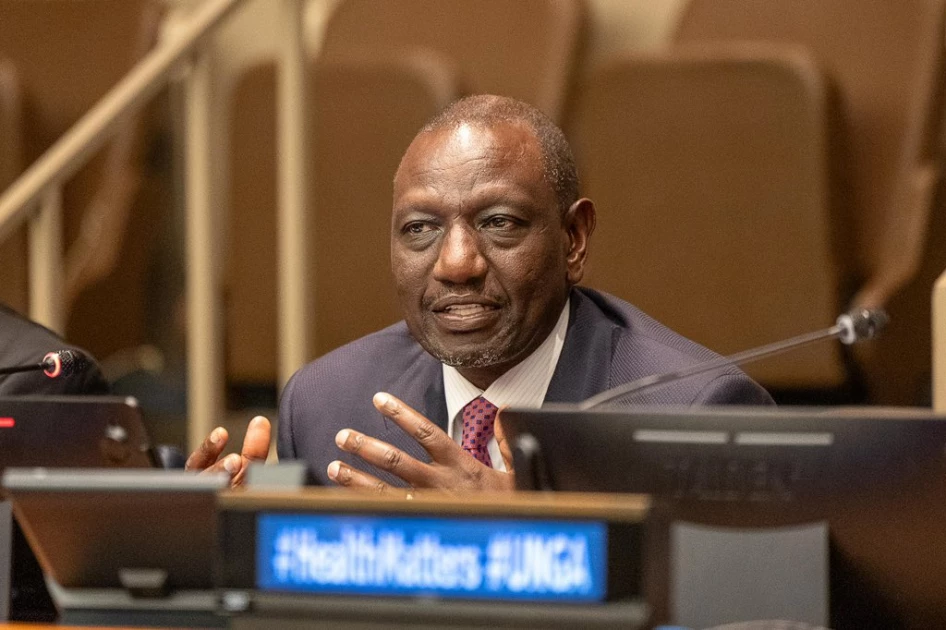OPINION: Africa’s inclusion indispensable to a just and effective global order

President William Ruto speaking during the Uniting for Global Health Security Meeting on the sidelines of UNGA, New York. PHOTO| PCS

Audio By Vocalize
By Dr. A. Korir Sing’oei,
At this historic juncture, when the world is confronting overlapping crises of debt, climate change, conflict, and technological disruption, Kenya stood tall, reminding the international community that global governance cannot afford to remain frozen in the geopolitics and geoeconomics of the post–Second World War.
Founded when most African nations were still yoked by colonialism, the UN and other post-war institutions must evolve inclusive architectures or risk losing relevance and legitimacy.
For Kenya, Africa, and indeed for the developing world, the call for reform is not an academic exercise. It is a matter of survival, dignity, and fairness. The global financial system, for instance, continues to punish African economies with egregious lending conditions based on spurious risk ratings while offering concessional credit to wealthier countries in the North.
The result is a vicious cycle of debt and austerity, locking out millions from opportunities for growth. At UNGA, Kenya pressed for reforms that would allow developing nations fairer access to development finance, debt relief mechanisms that do not strangle economies, and global financial institutions that recognize the promise and potential of Africa rather than overplay its risk profile.
For Kenya, this would mean reduced cost of capital, more predictable financing for infrastructure, and ultimately, a stronger foundation for jobs and livelihoods for citizens. For Africa, it would mean liberation from a system that too often keeps its people at the margins of global trade, investment pathways, and prosperity.
Reform of the United Nations Security Council was another central strand of Kenya’s message. Through the Committee of Ten (C-10), President Ruto amplified Africa’s long-standing demand for permanent representation at the UN Security Council. Today, a continent of 1.4 billion people remains on the menu of Security Council debates but absent from the table where those debates are decided.
Kenya argued that this exclusion not only undermines the legitimacy of the UN but also weakens the effectiveness of global peace and security efforts. From Sudan to the Democratic Republic of Congo and Somalia, Africa’s conflicts dominate the Council’s agenda, yet Africa is denied a permanent voice in shaping solutions.
For Kenya, a country that has consistently contributed troops, diplomacy, and ideas to global peace efforts, the question is simple: how can peace be forged without the participation of those most affected? For the region, meaningful reform would bring decisions closer to the lived realities of those affected by conflicts and open the door to more durable solutions.
Climate change was also a matter of significant attention for Kenya’s delegation at #UNGA80. As Chair of the African Union’s Committee of Heads of State and Government on Climate Change (CAHOSCC), President Ruto emphasized that Africa—the least polluting continent yet the most affected by climate shocks—cannot continue to be an afterthought in global climate financing.
With over 90 percent of its electricity grid powered by renewables, Kenya is already showing what a green future looks like. Yet scaling this requires financing that is accessible, predictable, and fair, as Kenya argued during an event on scaling up climate adaptation financing hosted by the Global Centre on Adaptation and the African Development Bank.
Speaking a day after President Trump’s address to the Assembly, where he expressed skepticism about the urgency of climate action, President Ruto’s assertion that carbon emissions’ impacts on atmospheric conditions are undeniable affirmed that climate change is an issue on which Kenya “agrees to disagree” with one of its closest strategic partners.
Underlying all these calls is Kenya’s conviction that multilateralism itself must be reimagined. The challenges of our age—pandemics, artificial intelligence, cross-border crime, cyber threats—cannot be solved by unilateralism or narrow national interest. They require inclusive, representative, and responsive institutions.
Nairobi is already positioning itself as Africa’s hub for digital governance and AI leadership, making the case that Africa cannot be left behind in the Fourth Industrial Revolution. At the High-Level Multistakeholder Launch of the Global Dialogue on Artificial Intelligence Governance during UNGA, Kenya pressed for frameworks that guarantee interoperability of data, equitable governance of digital infrastructure, and innovative financing for AI capacity-building across the developing world. Kenya’s position is clear: Africa’s youth cannot simply be consumers of technology—they must also be creators and regulators, shaping the ethics and future of AI itself.
But reforms at the global stage must also translate into hope at home. That is why Kenya wove economic diplomacy tightly into its UNGA agenda. By attracting partnerships and commendation for its affordable housing programme, Kenya demonstrated how multilateral engagement can drive real social transformation.
At the Kenya Investment Forum in New York, convened by KenInvest, a high-level panel headlined by President Ruto discussed investment opportunities in Kenya, bringing together key global players driving capital flows and investment growth. Discussions centred on the investment project pipeline and regulatory choke points that constrain the business climate.
Similarly, through the Global Africa Business Initiative (GABI), Kenya positioned Africa as the next frontier for investment, spotlighting opportunities from agriculture to energy, technology to infrastructure. For Kenyans, this could translate into new jobs, new industries, and an economy that speaks to the aspirations of the youth. For Africa, it signals a continent ready to claim its rightful place as a driver of global growth.
Kenya’s message at UNGA was therefore both a call for urgent action and a promise. The caution is that a multilateral system that excludes, ignores, or marginalizes will not survive the crises of our century. Reformed, inclusive, and equitable global governance institutions, on the other hand, promise to deliver peace, prosperity, and dignity for all.
Dr. A. Korir Sing’oei is the Principal Secretary, State Department for Foreign Affairs


Leave a Comment